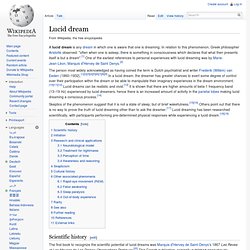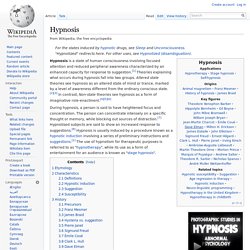

Lucid Dreaming Frequently Asked Questions. Using Electric Brain Stimulation to Trigger Lucid Dreams. Researchers have figured out how to make people aware of themselves during a dream: by zapping their sleeping brains with a weak electric current.

The sensation of "Hey, this is a dream! " is known as lucid dreaming. Those who naturally become lucid while dreaming, probably a small segment of the population, also report adventures that are impossible in the real world, such as flying, that feel completely real. Some can even change a dream's narrative twists and turns to make it less scary—or even more exhilarating. (Related: "Why Do We Dream? Lucid dreaming is exciting not only for dreamers but also for neuroscientists, who consider it a window into the study of consciousness. "We can really quite easily change conscious awareness in dreams," said lead investigator Ursula Voss, a clinical psychologist at Frankfurt University in Germany.
Zapping While Napping In this study, Voss and her team recruited 27 healthy young adults who had never experienced lucid dreaming. Lucid dream - Wikipedia. A lucid dream is any dream in which one is aware that one is dreaming.

In relation to this phenomenon, Greek philosopher Aristotle observed: "often when one is asleep, there is something in consciousness which declares that what then presents itself is but a dream".[1] One of the earliest references to personal experiences with lucid dreaming was by Marie-Jean-Léon, Marquis d'Hervey de Saint Denys.[2] Skeptics of the phenomenon suggest that it is not a state of sleep, but of brief wakefulness.[15][16] Others point out that there is no way to prove the truth of lucid dreaming other than to ask the dreamer.[17] Lucid dreaming has been researched scientifically, with participants performing pre-determined physical responses while experiencing a lucid dream.[18][19] Scientific history[edit] Philosopher Norman Malcolm's 1959 text Dreaming[22] had argued against the possibility of checking the accuracy of dream reports.
Hearne's results were not widely distributed. Initiation[edit] REM sleep. Hypnosis. Photographic Studies in Hypnosis, Abnormal Psychology (1938) Hypnosis is a state of human consciousness involving focused attention and reduced peripheral awareness characterized by an enhanced capacity for response to suggestion.[1] Theories explaining what occurs during hypnosis fall into two groups.

Altered state theories see hypnosis as an altered state of mind or trance, marked by a level of awareness different from the ordinary conscious state.[2][3] In contrast, Non-state theories see hypnosis as a form of imaginative role-enactment.[4][5][6] During hypnosis, a person is said to have heightened focus and concentration. Etymology[edit] Characteristics[edit] A person in a state of hypnosis is relaxed, has focused attention, and has increased suggestibility.[11] The hypnotized individual appears to heed only the communications of the hypnotist. It could be said that hypnotic suggestion is explicitly intended to make use of the placebo effect. Definitions[edit] Hypnotic induction[edit] Could Lucid Dreaming Be the Next Treatment for PTSD? Although philosophers and scientists have written about dreams for centuries, science is only just beginning to understand how dreams work in the brain.

Lucid dreaming (LD), in which the dreamer is aware that he or she is dreaming and is able to manipulate the dream, is even less well understood. “Often during a LD, you can control dream events voluntarily, for example flying, or you can gain access to waking cognitive abilities that are not normally available, such as remembering events from the previous day," explained Tore Nielsen, the director of the Dream and Nightmare Laboratory at Montreal's Sacre-Coeur (Sacred Heart) Hospital and a professor of psychiatry at the University of Montreal, in an interview with Healthline. "In regular dreaming, you are not aware that you are dreaming, you are not usually in voluntary control of dream events, and you don't usually have access to all your waking cognitive abilities.”
Learn More About Sleep: Healthy Sleep 101 » A New Battleground: Dreams.